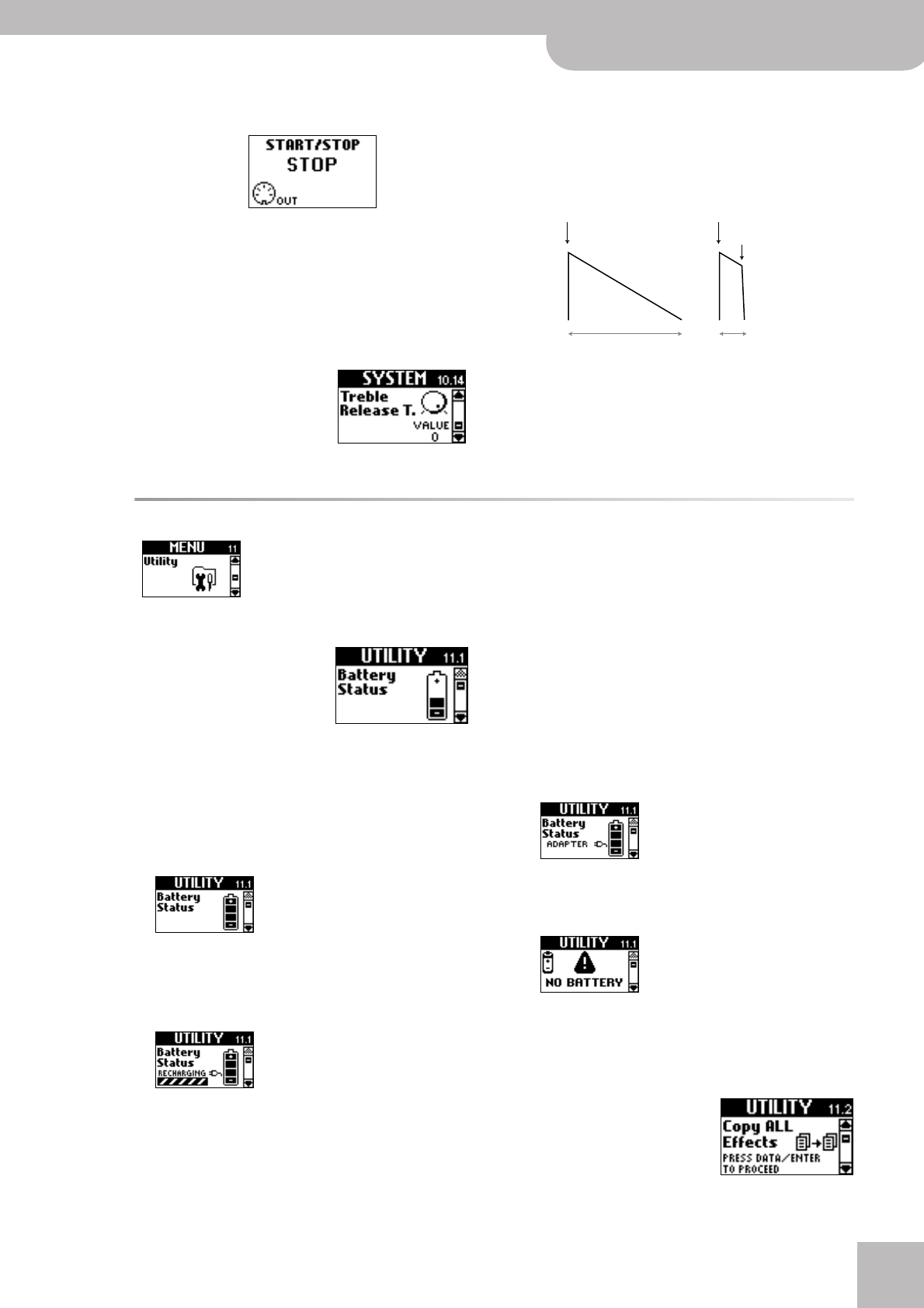
10.14 Treble Release T.
V-Accordion
r
73
The second time you press the [DATA÷ENTER] knob, the
display briefly shows:
Set this parameter to “Off” if you don’t want to use the
[DATA÷ENTER] knob for transmitting MIDI Start/Stop
messages.
Note: You can also assign the MIDI Start/Stop functionality to
one of the FBC-7’s foot switches. See “10.4 Pedal Controller” on
p. 68.
10.14 Treble Release T.
(–64~0~63, Default setting: 0)
Here is parameter that allows
you to shorten the Treble accor-
dion sounds if you feel the vir-
tual reeds linger a bit long after
you release a key. To do so, select a negative value. The
term “Release” is taken from synthesizers and refers to
the speed at which the notes you play disappear when
you release the keys.
Just think of the difference between a cymbal you hit
with and without muting (“choking”) it:
Of course, the difference is far less dramatic here, but it
may just be what you are looking for. You can also
make the notes longer by selecting a positive value. “0”
means that the original realease time doesn’t change.
11. UTILITY parameters
The UTILITY group contains three kinds of parameters: those that keep you informed (to check the bat-
tery status), several parameters that allow you to copy settings and three parameters for archiving
your settings via MIDI. See pages 38 and 40 for how to select and adjust the parameters.
11.1 Battery Status
The FR-7 comes with a Ni-Mh
battery that allows you to use it
without connecting it to the
supplied FBC-7. The FR-5 pro-
vides the same battery compart-
ment as the FR-7, but the battery is an option. (As long
as you do not purchase such a battery, you need to
connect the FR-5 to the supplied FBC-7.)
Note: There is no “EDIT” page here, because there is no parameter
you can set.
Depending on how the FR-7/FR-5 is powered, the dis-
play shows one of the following messages:
This message means that the FR-7/
FR-5 is powered by the battery in
its compartment. The battery icon
shows how much power is left.
It would be a good idea, however,
to stop by this page before you go on stage or start
playing, because what you see then might just con-
vince you to use the FBC-7.
This message means that the bat-
tery is being recharged by the
FBC-7. This is not performed auto-
matically. You need to connect the
FR-7/FR-5’s “TO FBC-7” socket to the “TO FR-7/FR-5
V-ACCORDION” socket on the FBC-7 and press the
BATTERY CHARGER button (so that it lights). The bat-
tery icon indicates the amount of energy already
available.
When the battery is fully charged, the display briefly
shows a “Recharge Complete” message.
While the FR-7/FR-5 is connected to the FBC-7, the
latter supplies the power to your V-Accordion (the
battery in the FR-7/FR-5’s compartment is therefore
bypassed). However, while the BATTERY CHARGER
button lights, the FR-7/FR-5 cannot be used, because
the FBC-7 “concentrates” on recharging the FR-7/
FR-5’s battery.
This message means that the FR-7/
FR-5 contains a battery, which is
not used, because the FR-7/FR-5 is
connected to the FBC-7. The FBC-7
therefore supplies the power to your V-Accordion.
The battery icon nevertheless informs you about the
battery’s current charge.
This message means that the FR-7/
FR-5 contains no battery. It is con-
nected to the FBC-7, however (oth-
erwise you would not be able to
switch it on). In the case of an FR-5 without an
optional battery, this is the only message you’ll ever
see.
11.2 Copy ALL Effects
This parameter allows you to
copy the settings of all three
effects processors from one Set
to another. This may help you
save time, because the effects
processors contain an impressive number of parame-
Release T(ime)
Release
T(ime)
This is where you hit
the cymbal
The sound disappears
gradually.
This is where you hit
the cymbal
Short sound
This is where you choke the
cymbal


















